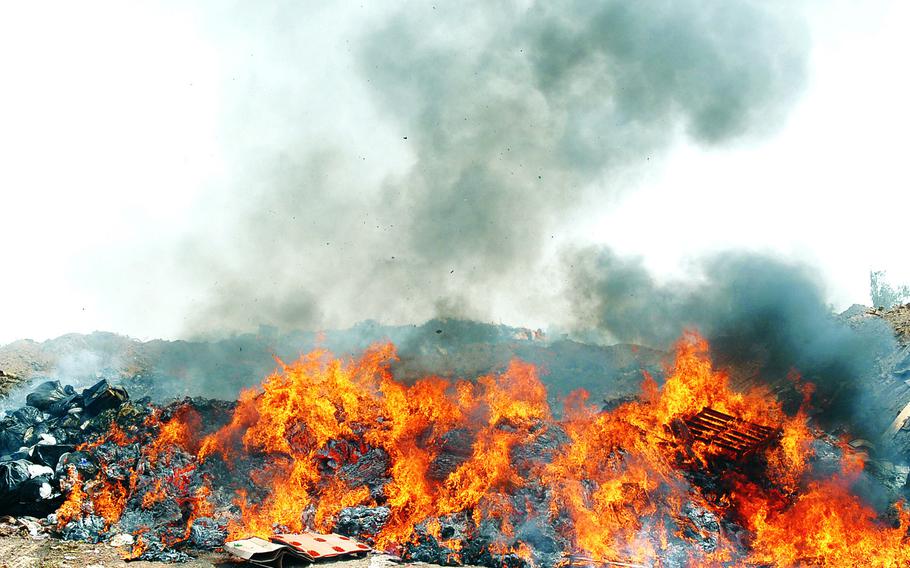
The burn pit at Balad Air Base, Iraq, was in full operation in 2008. Many of the bills under consideration in Congress aim to help veterans exposed to open-air burn pits, which were used throughout the 1990s and the post-9/11 wars to burn garbage, jet fuel, paint, medical waste, plastics and more. (Stars and Stripes)
WASHINGTON — The Department of Veterans Affairs asked Congress on Wednesday to hold off making major changes to the agency’s process of handling military toxic exposure until it finishes an internal review this fall.
Lawmakers on the House Committee on Veterans’ Affairs met Wednesday to discuss 15 bills that aim to help veterans suffering from illnesses believed to be caused by toxic exposure during overseas deployments. These veterans often face difficulty securing benefits through the VA because of the lack of scientific evidence linking their conditions to various exposures.
The committee leaders, Reps. Mark Takano, D-Calif., and Mike Bost, R-Ill., said they planned to combine the legislation into one comprehensive package to push through the House this year. This falls in line with the Senate’s plans, where Sens. Jon Tester, D-Mont., and Jerry Moran, R-Kan., have plans to create a reform bill and send it to the Senate floor May 30, before Memorial Day.
“We cannot continue to tackle this topic one exposure at a time or one disability at a time,” Takano said. “We’re committed to advancing comprehensive legislation this Congress.”
However, the VA wants Congress to wait until it has finished an internal review of its process that was initiated by the new VA secretary, Denis McDonough. Ronald Burke, deputy undersecretary for policy and oversight, said the VA would finish its review and propose a plan to Congress within 180 days.
The statement drew ire from some lawmakers, who stressed the importance of acting quickly to help veterans secure their earned benefits.
“My responses today are not designed to frustrate the committee,” Burke said. “The department is committed to working with Congress and addressing this in a more holistic, faster, more accurate approach that is desperately needed.”
In the meantime, Burke said the VA was taking some steps to improve its claims process. It has expanded training about toxic exposures for health care providers and is taking into account more research and data when considering claims on a case-by-case basis, Burke said.
The department is encouraging more veterans to file claims, which will help the VA gain more insight into the conditions related to toxic exposure. Burke acknowledged that some veterans are wary of filing claims because of the “overly cumbersome process” and an assumption that they will be denied.
At the end of its review, the VA hopes to have a “new and decisive” approach to toxic exposure claims, he said.
“The VA is creating a new, comprehensive, modernized decision-making model for determining presumptives based on environmental exposures,” Burke said. “We are moving with a sense of urgency.”
It remained uncertain Wednesday exactly how and when lawmakers would move forward with a comprehensive bill.
Many of the bills under consideration aim to help veterans exposed to open-air burn pits, which were used throughout the 1990s and the post-9/11 wars to burn garbage, jet fuel, paint, medical waste, plastics and more. Veterans diagnosed with cancer, respiratory issues and lung disease at young ages have blamed exposure to the toxic fumes.
Some of the bills address issues faced by older veterans, including those exposed to Agent Orange during the Vietnam War and “atomic” veterans who participated in the military cleanup operation of radioactive sites in the Pacific Ocean in the 1970s.
“For generations, veterans have struggled getting benefits and services from the VA,” Bost said. Too often, they’re denied benefits because there isn’t enough science to determine if their condition is linked to their time in uniform. Making that connection could take years. We need help now.”
wentling.nikki@stripes.com Twitter: @nikkiwentling